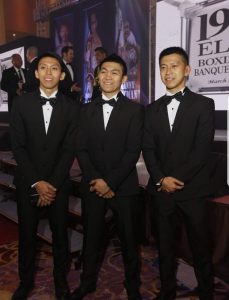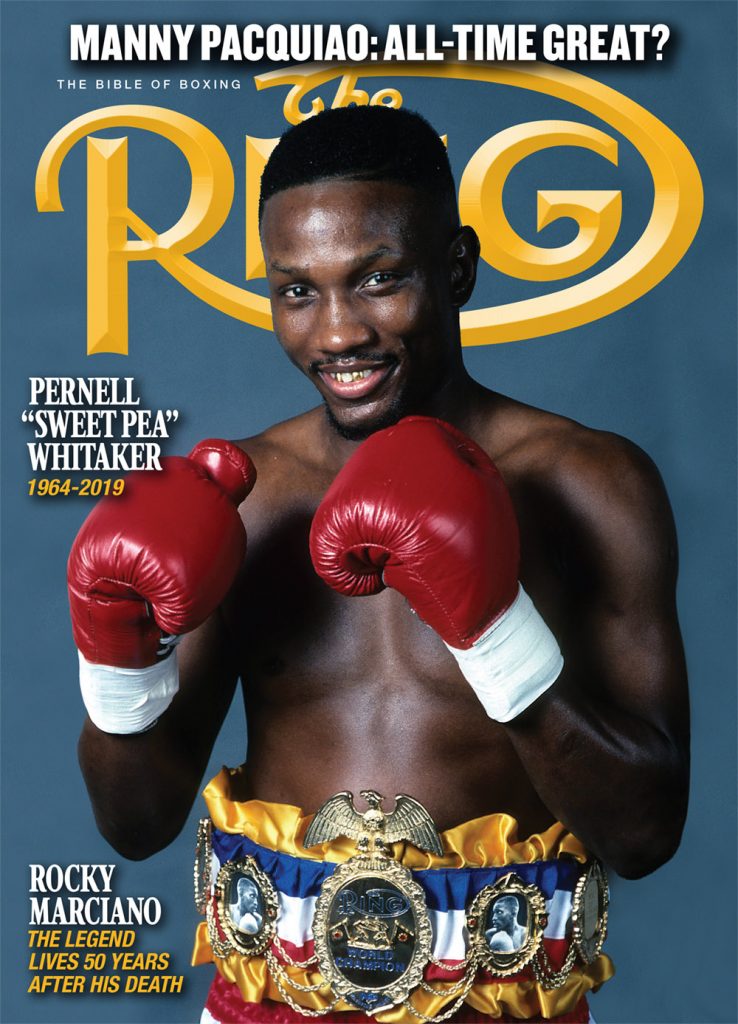Mig Elorde is ready to step out of famous grandfather’s shadow

As the grandson of boxing legend Gabriel “Flash” Elorde, there was no avoiding the sport for Juan Miguel Elorde. It was everywhere he turned as a kid, with his parents operating the Elorde Gym (which Flash himself founded) and promoting local boxing cards. When Ronnie Magramo, one of their boxers, used to fight abroad, “Mig” Elorde would carry the Philippine flag into the ring.
Elorde was even in the history books he studied in second grade. “They’re saying ‘oh it’s your grandfather, he’s famous,’” Mig Elorde remembers of his classmates’ reactions. Him and his older brother, Juan Martin “Bai” Elorde, would go down to the gym to watch the fighters, and then “spar” when their parents weren’t around.
Despite their family history, Johnny and Liza Elorde weren’t receptive when Mig and Bai expressed interest in getting in the ring themselves for some amateur fights.
“I did not want my children as a mother to be boxers because my first idea is you’re hurting each other,” said Liza Elorde. Johnny, one of Elorde’s seven children, deferred to his wife on the matter. That’s when Mig and Bai elevated the matter to the Supreme Court of the family, Laura Elorde, their grandmother and the widow of Flash Elorde.
“Eventually she said ‘OK, it’s just amateur,’” remembered Liza, who imposed her own condition on the agreement.
“They just said as long as you graduate from your school [you can box],” said Mig Elorde.
Now, 52 years after Flash Elorde’s seven year reign as junior lightweight champion ended, Mig Elorde (28-1, 15 knockouts) has the opportunity to bring a second world championship to his family when he faces WBO junior featherweight titleholder Emanuel Navarrete (28-1, 24 KOs) on September 14 at the T-Mobile Arena in Las Vegas. The bout will serve as the co-feature underneath the Tyson Fury-Otto Wallin main event on an ESPN+ card promoted by Top Rank.
Yet while Mig Elorde grew up idolizing his grandfather, a 1993 International Boxing Hall of Fame inductee, and bares a strong familial resemblance to Flash, he grew up far differently. Flash Elorde was a hardscrabble youngster from a small town in Cebu province, scraping by an existence shining shoes and washing dishes before becoming a national icon, a Manny Pacquiao of the 60s before Pacquiao was even born.

From left: Elorde brothers Nico, Bai and Mig. Photo by Liza Elorde
Mig Elorde, 32, had few of those struggles, and played basketball for his school until seventh grade, when the boxing itch got to him. He fought four times as an amateur, winning three times, while taking off two years after the first bout to focus on his studies at College of St. Benilde. He graduated with a degree in restaurant and hotel management and now co-owns a pair of businesses with his older brother Bai: Southpaw Grill, a restaurant right in front of the Elorde Gym in Sucat, Paranaque City, and the newly opened Flash Wash, a laundromat in nearby Muntinlupa City.
Top boxers come almost exclusively from poor backgrounds, in the Philippines and elsewhere, but Elorde doesn’t think that is the lone indicator of fighting success.
“It’s on your dedication, it’s not whether you’re rich or poor, it’s how you love the sport and how you perform,” said Mig Elorde. “For me it’s just my dream, I want this to become my reality. I want to become a world champion.”
The Elorde brothers were invited to join the national amateur team but shortly after joined the pros, with Bai (24-2-1, 11 KOs) making the jump in 2007 and Mig following a year later.
Mig Elorde ran his record to 10-0 before stepping up in competition against the likewise undefeated Jerry Guevara in 2011. It was his first bout in Las Vegas, the night before Pacquiao fought Juan Manuel Marquez a third time. Fighting outside of home territory for the first time got to him, and perhaps the pressure of representing his famous surname as well. He lost a unanimous decision in the four rounder.
“Maybe I was too excited, thinking about the fight a lot. Especially the pressure, the pressure is always there,” said Elorde. “After the fight I gained a lot of experience.”
At a time when he could have walked away from boxing as something he just needed to get out of his system, his father, a 1979 Southeast Asian Games gold medalist, gave him the encouragement to keep going.
“[Mig] was so depressed, but Johnny said ‘You’re just starting, if you want to be a champion you have to strive even more,’” remembered Liza Elorde.
***
“Flash” Elorde made his mark on the sport as 130 pound champ from 1960-1967, but Mig says his favorite fight was his 1956 rematch with Sandy Saddler for the featherweight championship. The fight was another close one, a rematch of Elorde’s win the previous year in Manila in a non-title fight. Saddler, using every trick in the game, had bloodied the shorter Elorde to the point of stoppage in the 13th round.
“He was bleeding but was still fighting,” said Mig Elorde.
Mig never met his grandfather, who died a year before he was born at age 49, but his mother says there are many similarities between them.
“Almost all of the children followed in the footsteps of Daddy, not only in terms of charity but because they are so religious. Mig goes to mass every Sunday and holiday,” said Liza. “And he’s so quiet, he’s not really a talker, he just smiles, those characteristics are also characteristics of Daddy.
“He’s so simple he doesn’t buy shoes…sometimes it takes years before he changes some of his rubber shoes.”
Mig Elorde also shares an interest in helping the poor children of his community. When he was younger, he’d invite the children at St. Rita Orphanage – which was established with funding from “Flash” Elorde – to their house for his birthday. He’d invite the street children to watch his training, and provide food and a place to bathe for them. He also would join family trips to Tondo – one of the poorest areas of Metro Manila – to help feed the local children.
“Up until now, they are usually coming with us to serve children in the poor areas,” said Liza Elorde.
***
Since his only loss, Mig Elorde has won 18 straight, though his competition has mostly been against overmatched Southeast Asian opposition from Indonesia and Thailand.
Navarrete, 24, of Mexico City is a significant step-up from that level. Picked as a voluntary defense for Isaac Dogboe’s New York debut last December, Navarrete pulled the upset, using his relentless pressure and five inch height advantage to wear down Dogboe for the unanimous decision win. He replicated the effort in May, dropping the former champion twice before the fight was stopped in the twelfth. He then followed that up earlier this month with a third round blowout of Francisco De Vaca.
Elorde, the no. 2 contender, says he only found out about the fight a week ago, but had already been in training for a fight on September 21. Asked to name a fighter in his camp who can mimic the same style of the swarming Navarrete, he pointed to Giemel Magramo (23-1, 19 KOs), a flyweight contender and the nephew of Ronnie.
The challenge will be for Elorde to hit Navarrete hard enough to gain his respect early to keep the champion from pushing the pace early, Elorde says.
Switching schedules, Elorde convened with trainers Toto Laurente and his father Johnny, plus Dan Rose, an American “performance coach” from Emporia, Virginia. Rose had worked with several teams in the Philippine Basketball Association, and met the Elorde brothers in 2011 through their brother Nico, a pro basketball player who was playing college ball at the time.
Rose does conditioning work, helps with nutrition, and works to keep the athletes motivated.
“Mig’s so quiet but if you look in his eyes you see that look that most elite athletes have. Not all elites are boisterous or showy,” said Rose. He says that Elorde keeps in shape year round, and believes that will keep him in good standing throughout the fight.
“From what I understand the reason they keep Navarrete in the ring is because he will go up in weight soon so keeping him active is the best thing for him so apparently he has some weight issues,” said Rose. “He’s only 24 so his body is put in a state that it naturally don’t want to be in.
“It’s gonna be interesting to see how he fares against someone just as tall as him and whose body is used to being at weight.”
It’s one thing to fight in the comfort of ballrooms named after his grandfather, surrounded by family and supporters from his neighborhood. Returning to the bright lights of Vegas, which hadn’t been kind to him in the past, to face a heavy favorite, will be his biggest test to date.
“It’s really a big pressure. All of the people are expecting a lot from us,” said Mig Elorde. “It’s hard to protect the name of Elorde but my parents always told me not to think of the pressure.”
This is what he’s wanted since he first found out who his grandfather was, and what he meant to people. Now it’s up to Mig Elorde to show how much he wants it.
“I want to prove that I can also be like [my grandfather],” he said. “Even though it’s hard, I want to prove to everyone that I can also be a world champion.”
Ryan Songalia is a member of the Boxing Writers Association of America and part of the Craig Newmark Graduate School of Journalism Class of 2020. He can be reached at [email protected].
Struggling to locate a copy of The Ring Magazine? Try here or
Subscribe
You can order the current issue, which is on newsstands, or back issues from our subscribe page.















